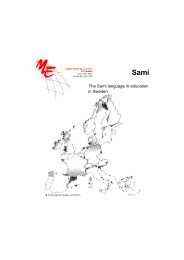Multilingual Early Language Transmission (MELT) - Mercator ...
Multilingual Early Language Transmission (MELT) - Mercator ...
Multilingual Early Language Transmission (MELT) - Mercator ...
You also want an ePaper? Increase the reach of your titles
YUMPU automatically turns print PDFs into web optimized ePapers that Google loves.
3. <strong>Multilingual</strong> <strong>Early</strong> <strong>Language</strong> <strong>Transmission</strong><br />
As indicated in chapter 1 we prefer the terms regional & minority languages and majority<br />
language. In this paper we use the term multilingualism and in this chapter will define the<br />
concepts bi-, pluri-, and multi-lingualism. Chapter 3.2 describes the concept early language<br />
learning. Chapter 3.3 presents the definition of <strong>MELT</strong>. The important stages of bilingual<br />
development from young children are presented in chapter 3.4. Chapter 3.5 presents an<br />
historical overview of Bilingual First <strong>Language</strong> Acquisition (BFLA) and the need and the<br />
factors to stimulate language acquisition are described.<br />
3.1 <strong>Multilingual</strong>ism in society and individuals<br />
<strong>Multilingual</strong>ism as a social phenomenon is common throughout Europe, and indeed the<br />
whole world. In the twenty-first century, all European citizens live in a multilingual<br />
environment. In their daily lives they come across many different languages. As a<br />
communication tool, languages are useful in communicating with others for trade, tourism,<br />
and international contacts. In its symbolic function, language carries the deepest emotions<br />
and the historical awareness of its speakers. The mother tongue is the language children<br />
acquire first in life. It is also the language that most people know best, use most, and<br />
strongly identify with. All people have the right to learn and use their mother tongue and to<br />
learn a second or third language. In many cases, these rights are still absent, or there are no<br />
adequate provisions. Regional & minority languages are spoken by more than ten percent of<br />
the European population. Particularly for some languages, their situation and future<br />
prospects are critical.<br />
This section describes some definitions of bi-, pluri-, and multilingualism formulated through<br />
experts. They form the basis for overthinking about multilingualism within the <strong>MELT</strong> project.<br />
Chapter 3.2 presents the concept early language learning. Those definitions and theories are<br />
the basis of the definition of <strong>MELT</strong>, that will be presented in chapter 3.3.<br />
Most socio- and psycholinguistic researchers define ‘multilingualism’ as the use of three or<br />
more languages. However, this entails defining what a language is, which can be<br />
problematic, according to Kemp (2009: 11). A number of terms are used by different<br />
researchers within the different fields. Kemp (2009) describes the term ‘multilingualism,’<br />
using other definitions from other researchers, that are summarised in the book “The<br />
exploration of multilingualism: development of research on L3, multilingualism and multiple<br />
language acquisition” as follows: (…) “Most researchers now use the term ‘bilingual’ to refer<br />
to the individuals who use two languages, and ‘multilingual’ to refer to individuals who use<br />
three or more languages” (Kemp, 2009: 24).<br />
Edwards (1994) describes a multilingual person as: “A person who has the ability to use three<br />
or more languages, either separately or in various degrees of code-mixing. Different<br />
languages are used for different purposes, competence in each of then varying according to<br />
such factors as register, occupation and education” (Edwards, 1994, in Kemp, 2009: 15).<br />
According to Hall (2001) the term bilingualism and multilingualism “…is currently used to<br />
refer to pupils who live in two languages, who have access to, or need to use, two or more<br />
47



